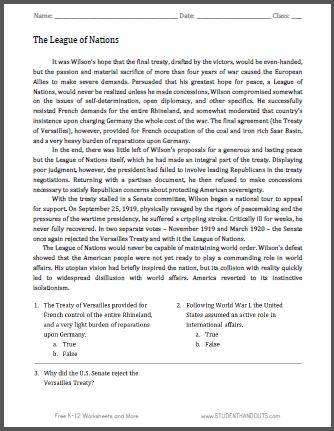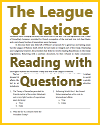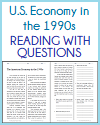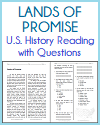| The League of Nations Reading with Questions |
|---|
| www.studenthandouts.com ↣ American History ↣ American History Readings with Questions |
It was Wilson's hope that the final treaty, drafted by the victors, would be even-handed, but the passion and material sacrifice of more than four years of war caused the European Allies to make severe demands. Persuaded that his greatest hope for peace, a League of Nations, would never be realized unless he made concessions, Wilson compromised somewhat on the issues of self-determination, open diplomacy, and other specifics. He successfully resisted French demands for the entire Rhineland, and somewhat moderated that country's insistence upon charging Germany the whole cost of the war. The final agreement (the Treaty of Versailles), however, provided for French occupation of the coal and iron rich Saar Basin, and a very heavy burden of reparations upon Germany. In the end, there was little left of Wilson's proposals for a generous and lasting peace but the League of Nations itself, which he had made an integral part of the treaty. Displaying poor judgment, however, the president had failed to involve leading Republicans in the treaty negotiations. Returning with a partisan document, he then refused to make concessions necessary to satisfy Republican concerns about protecting American sovereignty.
In the end, there was little left of Wilson's proposals for a generous and lasting peace but the League of Nations itself, which he had made an integral part of the treaty. Displaying poor judgment, however, the president had failed to involve leading Republicans in the treaty negotiations. Returning with a partisan document, he then refused to make concessions necessary to satisfy Republican concerns about protecting American sovereignty.With the treaty stalled in a Senate committee, Wilson began a national tour to appeal for support. On September 25, 1919, physically ravaged by the rigors of peacemaking and the pressures of the wartime presidency, he suffered a crippling stroke. Critically ill for weeks, he never fully recovered. In two separate votes—November 1919 and March 1920—the Senate once again rejected the Versailles Treaty and with it the League of Nations. The League of Nations would never be capable of maintaining world order. Wilson's defeat showed that the American people were not yet ready to play a commanding role in world affairs. His utopian vision had briefly inspired the nation, but its collision with reality quickly led to widespread disillusion with world affairs. America reverted to its instinctive isolationism. Questions with answers in bold: 1. The Treaty of Versailles provided for French control of the entire Rhineland, and a very light burden of reparations upon Germany. a. True b. False 2. Following World War I, the United States assumed an active role in international affairs. a. True b. False 3. Why did the U.S. Senate reject the Versailles Treaty? Wilson had failed to involve leading Republicans in the treaty negotiations; while on a national tour to appeal for support, he suffered a crippling stroke from which he never fuly recovered. Click here to print this worksheet. |
 |  |  |  |  |  |
| www.studenthandouts.com ↣ American History ↣ American History Readings with Questions |














































